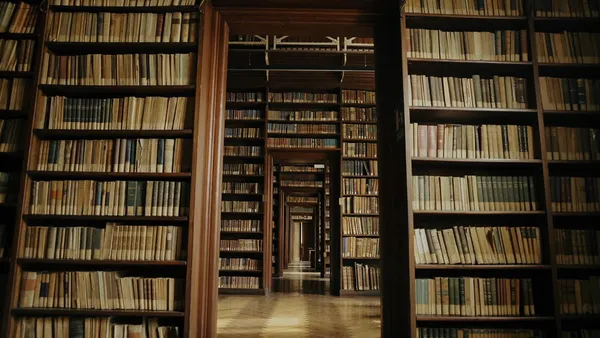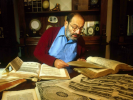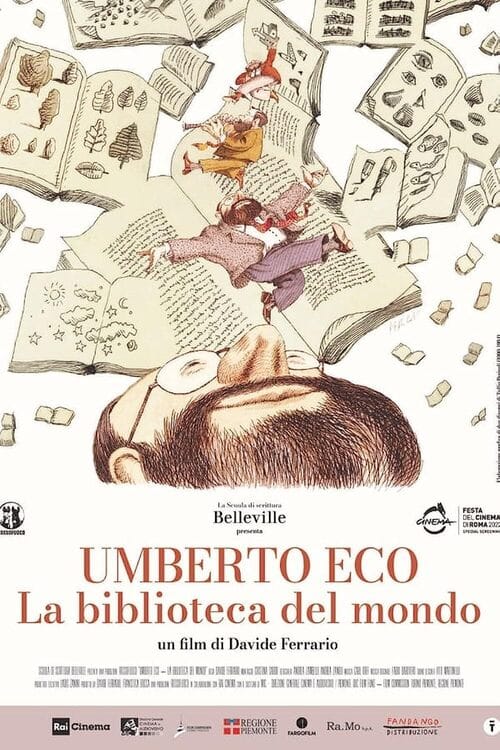Eye For Film >> Movies >> Umberto Eco - A Library Of The World (2022) Film Review
Umberto Eco - A Library Of The World
Reviewed by: Jennie Kermode

Around the time of the death of the acclaimed writer, bibliophile and intellectual adventurer Umberto Eco, a video appeared on the internet of him walking around his personal library, inspiring awe and no small measure of envy in those who watched it. One of Eco’s great talents was to sweep people up in his adventures due to his infectious sense of wonder, so he never gave the impression of hoarding treasure, rather of accumulating what was necessary to become a treasure. The opening of Davide Ferrario’s documentary picks up where that video left off and takes us further, much further, into a labyrinthine structure which might have left Borges dizzy. The Argentine’s metaphor is also extended here. We are invited to imagine the library as an aspect of God, and God as the ultimate library.
Though we will spend much of the film in this particular library, dwelling on the the texture of old, rough-edged pages and scarred leather bindings, the corpses of plants and animals reshaped into storehouses of wisdom and inadvertent humour, Ferrario also transports us to others. The high domed ceilings, the astonishing cornicing, frescos, statuary and other architectural flourishes in these places testify to their religious quality, to the transcendence of reason and understanding and truth. Eco, however, was fascinated by lies, of which he speaks directly in archive footage here. His personal collection included treasured books full of wild assumptions and disproven theories, bizarre conjectures of conspiracy and a celebration of characters who, though born to fiction, became almost real due to the frequency with which they were perceived as such, giving them their own place in history. Where readers could not connect with the Italian master’s genius, his sense of mischief often won through.

If you are an Eco fan, you will find this film a pleasure from start to finish, and be disappointed only in its brevity. Alongside the archive interviews and clips from his TV appearances, there is a chance to see some of his notes, often in pictorial form, including sketches of characters from his ventures into fiction. There are also interviews with family members, most notably a grandson who remembers him reading the children’s stories he had enjoyed in his own youth and trying to coax him into engagement with ideas for which he was not ready. This eases us into reflection on Eco’s love of non-intellectual books, even of giallo tales, and his respect for literature created first and foremost for entertainment.
Key interests and ideas from the latter part of the writer’s life are explored here, and spoken on with passion – no less so when they contradict each other, as he was never afraid to change his mind. They position him very much as a modern thinker, keenly relevant even seven years after his death because he was often ahead of his contemporaries, for all that his love of medievalism led to him being associated with old fashioned ideas. The library theme naturally lends itself to a focus on his thoughts about the internet, and what is perhaps its key problem. Memory has two purposes, he said: firstly to acquire information, and secondly to throw out the low quality stuff. When we substitute the internet for our memory, its failure to do the latter becomes a problem.
The flawed information – all those wonderful accidental lies – needs context to make sense. Eco said that the purpose of language is to communicate our awareness or imagining of what is not there. The library is held together by these absences, begetting questions, conjuring the shape of Eco’s own absence and inviting the viewer’s curiosity to fill it. As we wander through the labyrinth we are drawn further and further into its trap, made ever more keenly aware of our own hunger for knowledge, for understanding. Alongside the books there are maps, some of them featuring imaginary places which sparked real journeys. Voluminous tomes with age-stained pages sit side by side with even older scrolls. Here are the diagrams and formulae of alchemists and occultists, and always the humorous little drawings which continue to make Eco feel alive – alive as, he notes, in their absence of intellectual hunger, many people never really are.
The subtitling here could use some improvement, but if you love languages as Eco did, you will find its foibles fascinating and often funny, themselves a winning feature of this cinematic palimpsest. A library has a particular aroma, we are told, and you will smell it. It has a presence which is more than the sum of its parts. It carries us beyond death, makes us a part of something bigger. Eco’s library is a trickster god – always the most interesting kind, the most human.
Reviewed on: 29 Jun 2023
















